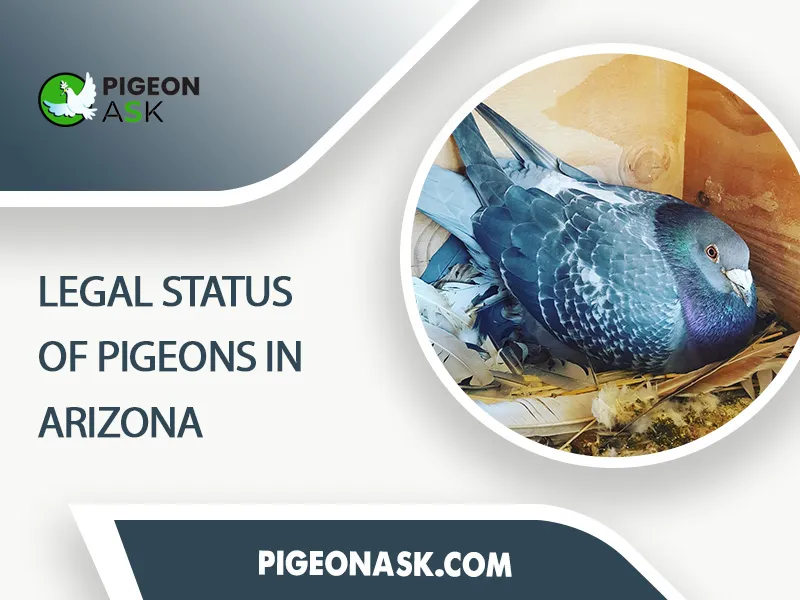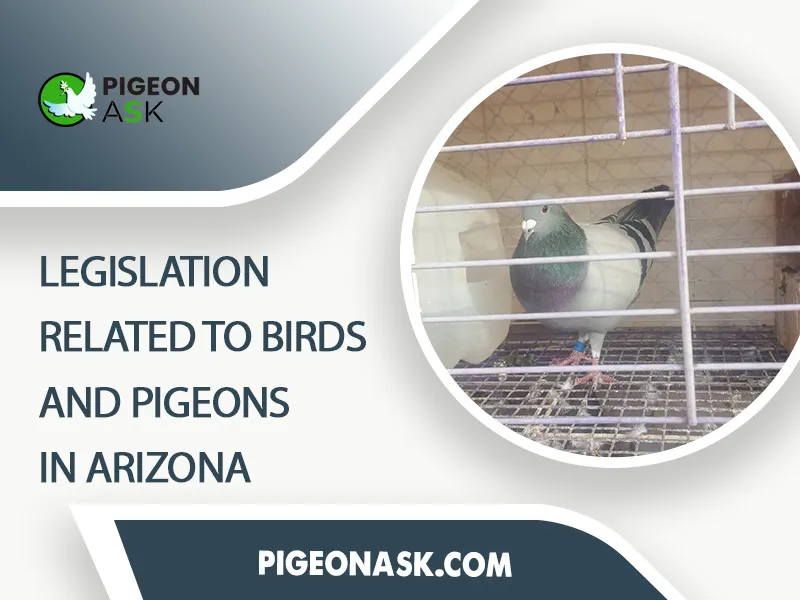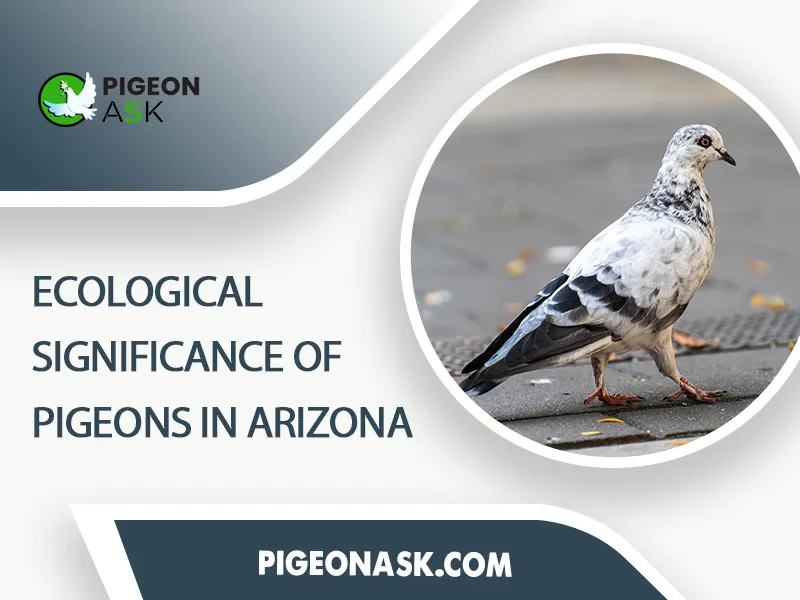Are Pigeons Protected in Arizona?
Pigeons are not protected by state wildlife laws in Arizona. They are considered non-native and unprotected wildlife. So, they do not have specific legal protections as native wildlife do. However, cruelty to any animal, including pigeons, is prohibited.
The majority of birds in Arizona are protected from hunting, possession, and transportation by the Migratory Bird Treaty Act. But Rock doves and Feral pigeons are not protected by this Act, and neither are some other birds.
In this article, I will dive into the regulations and protections surrounding Arizona’s pigeon population, examining both state legislation and federal guidelines to clearly understand where these birds stand in the eyes of the law.
Legal Status of Pigeons in Arizona
In much of the United States, specifically in Arizona, pigeons are considered non-native or non-migratory birds, typically not protected by federal laws.
Most city laws or regulations permit property owners or inhabitants to take steps to deter pigeons, particularly when they show signs of infesting a property.

The State of Arizona notably classifies only two species of pigeons: the Rock Pigeon and the Band-Tailed Pigeon.
Rock Pigeons are non-native and found all over the state. They are often considered pests and are generally not protected by law. On the other hand, Band-Tailed Pigeons are native to Arizona and protected by Arizona Game and Fish Department law.
Pigeons are considered a nuisance or pest species due to their droppings, noise, and potential to spread disease.
We have covered an in-depth article on “Pigeon News”; if interested, you can check this article here.
Legislation Related to Birds and Pigeons in Arizona
Laws and regulations related to pigeons are in place to ensure wildlife conservation and manage human interactions with wildlife in Arizona.

These laws are enacted and enforced by Arizona state and federal agencies, intending to protect bird populations and the ecosystems on which they depend.
Migratory Bird Treaty Act (MBTA)
One of the most significant pieces of federal legislation concerning birds is the Migratory Bird Treaty Act of 1918.
This Act makes it illegal for anyone to take, possess, import, export, transport, sell, purchase, or barter any migratory bird or the parts, nests, or eggs of such a bird without proper authorization.
Most bird species are covered by this law, including migratory pigeons. However, it does not typically include non-native species such as the feral pigeon.
Endangered Species Act (ESA)
The Endangered Species Act provides protections for species that are listed as threatened or endangered.
In Arizona, this could include bird species that are at risk due to habitat loss, climate change, and other factors. Band-tailed pigeons are protected under this Act because the species is native to this region.
The ESA prohibits the “take” of listed species, which includes harming, hunting, shooting, wounding, killing, trapping, or capturing.
Arizona Game and Fish Department (AGFD)
The Arizona Game and Fish Department is the state agency responsible for managing wildlife resources, including birds.
The AGFD enforces state laws that protect birds and provides guidelines for activities such as bird hunting.
For example, there are specific hunting seasons and bag limits for game birds like doves and waterfowl. It is illegal to hunt non-game birds, which are protected under state law.
City and County Ordinances
Local ordinances in Arizona cities and counties also address issues related to pigeons and other birds.
Pigeon keeping and feeding are governed by regulations and ordinances in Arizona, particularly in the city of Phoenix. According to the Phoenix City Code, it is unlawful for a person to keep pigeons within the city.
Ecological Significance of Pigeons in Arizona
Arizona is home to several species of pigeons, including the Rock Pigeon, Band-tailed Pigeon, and Eurasian collared dove.

While they are often considered urban pests, pigeons can play a role in the ecosystem and have ecological significance. Here’s an overview of their habitat and ecological significance in Arizona –
Food Source
Pigeons serve as a food source for urban predators like hawks and falcons. For example, peregrine falcons, which are also found in Arizona’s urban areas, hunt pigeons as part of their diet.
Seed Dispersal
Pigeons can help in the growth of some plant species by spreading seeds through their droppings, even though their contribution is reduced in urban environments.
Bioindicators
Studies have shown that urban pigeons can serve as bioindicators of environmental pollution, as they tend to accumulate various pollutants within their bodies. As a result, their health may be an indicator of wider environmental factors.
Nutrient Cycling
Their droppings can cause potential damage to buildings and vehicles but provides essential nutrients that can foster plant growth when deposited in soil.
Biological Control Agents
These birds consume massive amounts of seeds, some of which are from weed species. By eating these seeds, pigeons can help manage weed growth in certain areas.
Penalties for Violating Pigeon Associated Laws in Arizona
Penalties for violating laws in Arizona vary depending on the location and the severity of the violation. Here are some potential penalties and regulations that could be relevant for pigeon-related offenses in Arizona:

Feeding Bans
Some cities in Arizona may have ordinances against feeding pigeons in public spaces.
For example, the Phoenix City Code Section 23-30 forbids the feeding of pigeons in public parks. Violating such regulations could lead to fines between $150-$2500, depending on the severity of the offense.
Similar legislation was established by the city of Tempe, where feeding wild birds is punishable by the same minimum punishment of $150 and a maximum fine of $2,500 as other nuisance crimes. Additionally, violators may face criminal or civil charges.
MBTA Violation
The Migratory Bird Treaty Act (MBTA) carries heavy penalties for violations. Any MBTA infraction is considered a misdemeanor, which carries a maximum fine of $15,000 and a maximum six-month jail sentence.
Furthermore, taking migrating birds to sell them can result in a felony conviction that carries a maximum fine of $2,000, a maximum sentence of two years in jail, or both.
Animal Welfare Act
Violating the Animal Welfare Act (AWA) 1966 in the US can result in significant penalties. Any person who violates the law will be subject to a fine of $5000 for each violation. Also, the person can face imprisonment for 3 years under felony charges.
ESA Violation
Penalties for violating the Endangered Species Act can include fines ranging from $1500 to $60000 for knowingly taking an endangered animal.
Also, according to Section 9 of the ordinance, taking an endangered species with knowledge is a Class-A misdemeanor that carries a maximum one-year jail sentence.
Conservation and Management of Pigeons in Arizona
All pigeon species are not considered endangered in the US. So, conservation efforts are typically focused on ensuring that pigeon populations do not cause undue damage.

The state has implemented ordinances to address the problems related to pigeon droppings, noise, and infestations. Some key aspects of pigeon conservation and management in Arizona include:
Pigeon Control and Removal
Several companies in Phoenix offer pigeon control and removal services. These companies use humane methods to capture and relocate pigeons, ensuring the birds are not harmed.
Habitat Management
The change of habitat is a common strategy used to control pigeon numbers. This involves blocking access to locations used for breeding and roosting.
Some methods include installing spikes, nets, or angled covers on ledges where pigeons commonly roost.
These humane deterrents prevent pigeons from alighting and discourage them from establishing regular nests.
Population Control
If pigeon populations become too large and problematic, more active control methods should be applied. This can include the use of birth control substances such as OvoControl.
When ingested by pigeons, the medicine prevents eggs from being fertilized. This method is widely seen as a humane option for controlling pigeon numbers without resorting to lethal methods.
Public Education
One of the most important aspects of pigeon management is public education. These include informing the public about the negative impacts of overfeeding pigeons and the disease risks associated with pigeon droppings.
Research and Monitoring
Understanding pigeon behavior and population dynamics requires ongoing study and research. Scientists and wildlife biologists may conduct studies to assess the effectiveness of different management strategies.
Research study data is invaluable in developing new and improved methods for managing pigeon populations. This guarantees that conservation initiatives don’t unintentionally damage the ecosystem or other species.
Conclusion
Pigeons are not specifically protected by any federal endangered species laws. Their treatment is still subject to general bird protection under the Migratory Bird Treaty Act.
Arizona classifies pigeons, along with other wild birds, under the protection of the Migratory Bird Treaty Act, meaning it is illegal to harm, capture, or kill pigeons without proper authorization.
These rules strongly emphasize the necessity of humanely treating these birds and using moral management techniques.
